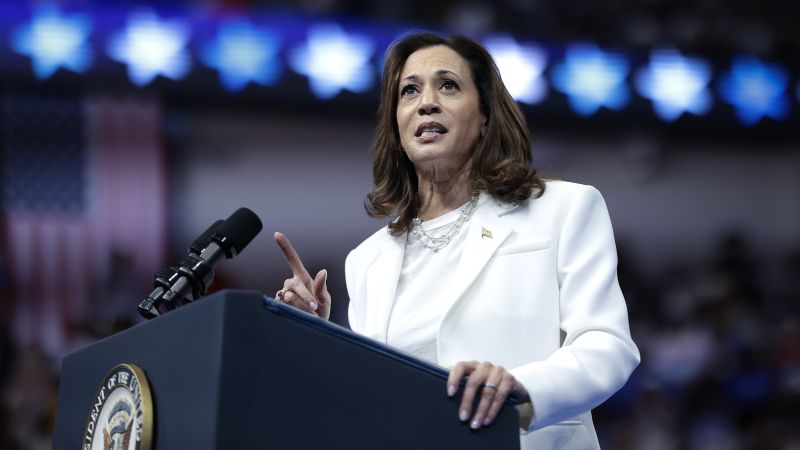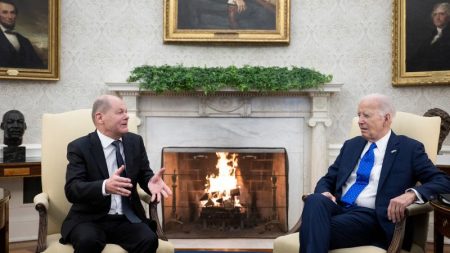Marcia Ruberg is old enough to remember what the country was like for women before the Supreme Court established a federal right to abortion in 1973, and the nearly 50 years that followed.
On Sunday, the 69-year-old retired psychologist, whose shirt read “Vote Like it’s 1973,” joined about 100 voters at a stop on the Kamala Harris campaign’s bus tour supporting reproductive rights. Her husband, Gary Goldberg, was by her side.
“I’m here to support my wife and everybody else that deserves the right to have freedom of their reproductive rights,” said Goldberg, a 70-year-old retired computer software developer.
Abortion access has long been viewed as an electoral issue that primarily motivates, and affects, women. But Democrats hope that the impact of the Supreme Court’s 2022 Dobbs decision — which was made possible by Trump-appointed conservative justices — and the wave of state abortion restrictions that followed, has created an opportunity to rally more men behind the cause.
The goal is not to persuade large swaths of men, but to broaden the range of people who see reproductive rights as an issue that touches their own lives. Even small gains — through a combination of driving up turnout among Democratic men and persuading some moderates and independents — could make a difference in states like Pennsylvania, where the presidential race will likely be decided by a razor thin margin.
The Harris campaign has tied the issue to a larger fight over freedom and utilized surrogates to share their personal stories of how abortion bans threatened the lives of pregnant women and their ability to conceive in the future. Many of those speakers have been men, from vice presidential nominee Tim Walz and second gentleman Doug Emhoff to the spouses of women who have shared their experiences.
Women clearly feel the impact of abortion restrictions, said Harris campaign manager Julie Chavez Rodriguez. “But we know that it impacts families as well,” she said. “It impacts fathers, husbands, spouses.”
And that message has resonated with some men whom CNN spoke to at the Philadelphia bus tour stop.
“I want all my nieces and all the women I love to have the ability to take care of their own bodies, make decisions about their own bodies, period,” said Michael Cook, 62, from Yardley, Pennsylvania, who attended the event with his spouse.
Whit Ayres, a Republican pollster, said that the election will come down to whether voters are more motivated by the issues that favor Republicans – the economy, inflation and immigration – or abortion, which is Democrats’ best issue. But the intensity of a voter’s views on certain issues matters as well.
“Everything we know now is that there are far more people motivated by the economy and inflation than there are motivated by abortion,” Ayres said. “But the people who are motivated by abortion are very intense and very motivated.”
Recent polls show that voters trust Harris more on abortion policy than Trump. But voters – especially men – are more likely to rank the economy as their top issue and say they have more faith in the former president to handle it.
A CNN poll released earlier this month found that 40% of likely voters in Pennsylvania – including 46% of men and 34% of women – rated the economy as their top issue, while 12% of likely voters – including just 4% of men and 18% of women – said abortion was their top issue. Women trusted Harris to handle abortion rights by a 56% to 31% margin, while men preferred her by 45% to 40%.
Samuel Chen, a Pennsylvania-based Republican strategist, said whenever campaigns can take an issue that affects a portion of the electorate and broaden it – in this case, by expanding discussions on abortion to include health care — they have an effective tool. At the same time, he argued, there’s no precedent for reproductive rights being a driving issue for men.
“You hear a lot of men talk about supporting women’s issues, women’s rights and reproductive rights issues like this, in support of their female counterparts, but those men were likely Democratic voters to begin with,” said Chen, a past staffer for former Pennsylvania Sen. Pat Toomey. “You don’t usually see this as a turning point issue for men that are independent, that are on the fence, that are ticket splitters.”
But Mike Mikus, a Democratic strategist based in Pittsburgh, said even small gains with men could help the Harris campaign in the state.
“You don’t need a big shift in the electorate,” he said. “Small shifts can have very big impacts.”
Pennsylvania Democratic Gov. Josh Shapiro pointed to recent election cycles – in which he and other Democrats beat anti-abortion Republicans – as evidence that men are also motivated by reproductive rights. He also argued Harris has been able to speak to voters on both reproductive freedom and the economic anxiety some feel.
“I think Kamala Harris understands how to walk and chew gum at the same time,” Shapiro told CNN. “I think she’s put forth plans to address both economic worries as well as our fundamental freedoms.”
According to AdImpact data, more than $21 million of the $87 million that Harris’ campaign has spent on broadcast TV ads has gone to spots that reference or discuss abortion. More than $4 million of that total has aired in Pennsylvania.
Pro-Harris outside groups have made abortion an even more significant share of their messaging — of the almost $90 million that Democratic outside groups have spent on broadcast TV since President Joe Biden dropped out, nearly $40 million has gone to ads referencing abortion.
Republicans, by contrast, have totally avoided abortion in presidential advertising. Out of $175 million spent on broadcast TV by GOP advertisers, including the Trump campaign and its allies, since Biden dropped out, none of the ads have mentioned abortion.
The Harris campaign’s Reproductive Freedom bus tour, which launched in Florida earlier this month, has featured some of what advocates call abortion storytellers, including Hadley Duvall, a reproductive rights advocate and rape survivor. In addition to the Philadelphia stop, Duvall is scheduled to appear at tour events in Scranton and Allentown. The bus tour is also making Pennsylvania stops in Harrisburg and Pittsburgh.
Humanizing the real-life impact of abortion bans that went into place after Roe was overturned with surrogates has been a cornerstone of the campaign’s strategy, said Morgan Mohr, Harris’ senior adviser for reproductive rights.
“The advantage of this tour is that it’s its own vehicle, no pun intended, through which we can engage surrogates and celebrities like you’re seeing here today, and leaders like Governor Shapiro,” Mohr said.
Several of the campaign’s male reproductive rights surrogates, including TV actors Tony Goldwyn and Zachary Quinto, will appear at a Men for Reproductive Freedom coalition event at the Friday Pittsburgh stop of their bus tour, a campaign spokesperson told CNN.
The event will be led by Josh Zurawski, the husband of Amanda Zurawski, who was the lead plaintiff in a case challenging Texas’s total abortion ban. Amanda Zurawski went into sepsis and developed scar tissue that permanently closed one her of fallopian tubes after her water broke early and she was denied miscarriage care, according to court filings.
The couple has become surrogates for the Harris campaign on reproductive rights, including at last month’s Democratic National Convention.
“I’m here because the fight for reproductive rights isn’t just a women’s fight,” Josh Zurawski said at the Chicago convention. “This is about fighting for our families, and, as Kamala Harris says, our future.”
Alexis McGill Johnson, the president of the Planned Parenthood Action Fund, pointed to his DNC speech as an example of how the Harris campaign can effectively message to men on the issue.
“I think it’s about drawing them into a bigger picture of the fact that they are likewise impacted when abortion bans have made pregnancy more dangerous,” Johnson said.
Fatima Goss Graves, the president of the National Women’s Law Center Action Fund, argued the vice president’s efforts to tie reproductive rights to her broader pitch on freedom is also drawing men in.
“It helps people understand that the issue of abortion access, and reproductive freedom generally, is connected to all of our freedoms,” Graves said.
At the recent bus tour stop in Philadelphia, Shapiro was the headliner, but Duvall’s remarks elicited the most emotion.
The room was silent as she told the audience that she became pregnant at age 12 after being raped by her stepfather, who had sexually abused her since she was five. She described feeling hope knowing she had the option to terminate the pregnancy, which ultimately ended in a miscarriage, and said she wouldn’t have that option today.
Kentucky, her home state, bans abortion at all stages except to save a pregnant patient’s life or physical health, with no exceptions for victims of rape or incest.
“I will vote for the younger me who deserved so much better and who deserved the options that she had,” Duvall said.
Duvall appeared in an ad during last year’s Kentucky governor’s race – hitting the GOP candidate for not supporting rape and incest exemptions – that Democrats credit with helping Gov. Andy Beshear win reelection.
Sitting aboard the Harris campaign’s tour bus, Duvall said she’s seen her story resonate with people because she could be anyone’s daughter, niece, sister, wife or neighbor.
“That’s what’s so scary, is that you hear that there are women going through these traumatic incidents and not able to get abortion care, and then men have the audacity to say it’s not their issue,” she said. “There is not a single man who doesn’t have a woman who is significant in their life, and that makes it everybody’s problem.”
Several of the male Harris supporters in the crowd pointed to those women as they discussed their support for reproductive rights.
Chris Scholding, a 50-year-old union electrician, said he was there because he has two daughters – a 20-year-old college student and a four-year-old toddler – and he felt a second Trump term would pose a broad threat to people’s rights.
Larry Padersky, a 60-year-old registered Republican from New Jersey who attended the Harris event with his 28-year-old daughter, said he doesn’t want the government infringing on anyone’s pursuit of happiness and said he was moved by Duvall’s story.
“It really rips your heart out to hear a true individual’s testament of what happened to her,” he said. “And I know that she’s not alone. If you hear stories like that, it just strengthens my opinion on reproductive freedoms.”
Read the full article here













